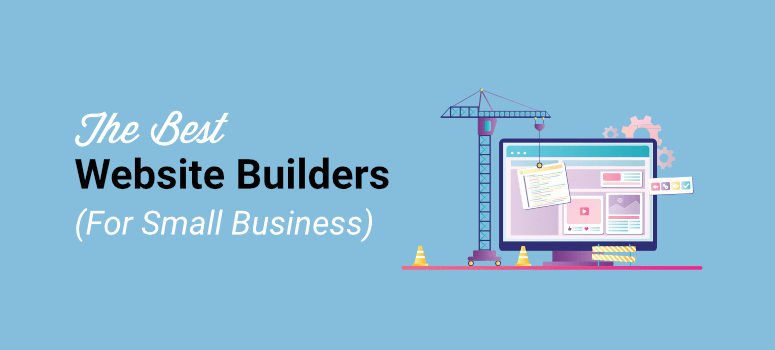Finding the best website builder for your small business can feel overwhelming. Many options promise different features and benefits.
Your website is your business’s online face. It needs to be professional, user-friendly, and affordable. But with so many choices, how do you know which one to pick? This blog post will help you understand what to look for in a website builder.
We will explore key features that make a website builder great for small businesses. Whether you need e-commerce capabilities, easy design tools, or reliable customer support, this guide will point you in the right direction. Let’s dive in and find the perfect fit for your business needs!
Table of Contents
ToggleIntroduction to Website Builders
Building a website is crucial for any small business today. A good website can attract customers, showcase your products, and provide important information. But many business owners don’t know where to start. That’s where website builders come in. They offer a simple way to create a professional-looking website without needing technical skills.
Importance for Small Businesses
Small businesses need to stand out online. A well-designed website helps build trust with customers. It shows you are serious about your business. It can also improve your visibility on search engines. This means more people can find you. With a website builder, you can create a website quickly and affordably. You don’t need to hire a developer or learn how to code.
Overview of Popular Platforms
Several website builders are popular among small business owners. Wix is known for its easy-to-use drag-and-drop features. Squarespace offers beautiful templates that are perfect for creatives. WordPress.com is great if you want more customization options. Shopify is the go-to for online stores. Each platform has its strengths. The best choice depends on your business needs.

Credit: foundr.com
Key Features to Look For
Choosing the right website builder for a small business is crucial. It impacts your brand’s online presence and functionality. Key features must be considered to ensure the builder meets your business needs. These features help in creating a professional and user-friendly website. Let’s explore some important features that can make a difference.
Ease of Use
A user-friendly interface is essential. It allows you to build your site without frustration. Drag-and-drop features simplify the process. Even those with no coding skills can design easily. Look for builders with clear navigation and tutorials. These tools help you manage your site smoothly.
Customization Options
Customization is key for personalizing your business site. A builder should offer flexible design templates. This lets you tailor your site to match your brand identity. Various themes and styles should be available. They help in creating a unique look for your business. Access to advanced tools for tweaks enhances customization. Make sure the builder supports CSS and HTML edits for deeper changes.
Budget Considerations
Choosing a website builder requires careful budget planning. Affordable options like Wix or Squarespace offer great features. Find the right balance between cost and functionality.
When choosing a website builder for your small business, budget considerations play a crucial role. Your website is an investment in your business’s online presence, and understanding the cost structures can save you from future financial surprises. Deciding between free and paid plans, and being aware of hidden costs, can guide you to make an informed choice that aligns with your financial goals.
Free Vs Paid Plans
Choosing between free and paid plans is one of the first decisions you’ll face. Free plans can be tempting, especially if you’re just starting out. They allow you to test the waters without any financial commitment. However, they often come with limitations, such as restricted features, bandwidth, and storage. Your website might also display ads, which can be unprofessional for your business image. Paid plans, on the other hand, offer more flexibility and features. They often provide a custom domain, better customer support, and advanced tools to enhance your site. Consider what features are essential for your business. Are you willing to sacrifice certain functionalities for a lower cost? A small monthly fee might be worth the investment for a more polished and professional website.
Hidden Costs
Be wary of hidden costs that can creep up unexpectedly. While the initial pricing of a website builder might seem affordable, additional charges can accumulate. Domain registration, premium templates, and third-party apps can add to your expenses. It’s important to read the fine print and understand what is included in your chosen plan. Sometimes, you might need to upgrade to access specific features. For instance, if your site grows in traffic, you might incur additional hosting costs. Evaluate what your business needs now and might need in the future. Planning for these potential costs can help avoid unpleasant surprises down the road. Budgeting for a website is much like budgeting for any other aspect of your business. How much are you willing to allocate to your online presence? Understanding these financial aspects can ensure your website remains a valuable asset rather than a financial burden. Have you thought about what your budget priorities are when selecting a website builder?
Top Website Builders for Small Businesses
Choosing the right website builder can make a big difference for small businesses. A good website builder helps create a professional and user-friendly site. This can attract more customers and grow your business.
Wix
Wix is a popular choice for small businesses. It offers a simple drag-and-drop interface. You do not need to know coding to create a website with Wix. It provides many templates to choose from, which can be customized to fit your brand. Wix also has a free plan, which is great for businesses on a tight budget. Its app market offers many tools to enhance your website’s functionality.
Squarespace
Squarespace is known for its beautiful design templates. It is perfect for small businesses that want a stylish and modern website. Squarespace is user-friendly and offers a range of features. It includes an easy-to-use content management system and e-commerce capabilities. This makes it a great choice for online stores. Squarespace also offers 24/7 customer support to help with any issues.
Comparing Seo Capabilities
Discover the best website builder for small businesses by comparing SEO capabilities. Evaluate tools that offer user-friendly SEO features. Ensure your choice supports effective online visibility.
When choosing the best website builder for your small business, understanding the SEO capabilities is crucial. A strong online presence can significantly impact your business’s growth. But with so many website builders claiming to be SEO-friendly, how do you decide which one truly supports your needs?
Built-in Tools
Many website builders come equipped with built-in SEO tools designed to enhance your site’s visibility on search engines. These tools often include basic features like meta tags, title editing, and image alt text options. Some even offer more advanced options like XML sitemaps and automatic URL redirects. Take Wix, for example. It offers an intuitive SEO Wizard that guides you step-by-step. This can be particularly helpful if you’re not tech-savvy. Squarespace also provides an easy-to-use platform with customizable page titles and descriptions. These built-in features can save you time and reduce the learning curve. But are these features enough? While built-in tools provide a solid foundation, they may not cover every SEO nuance. Relying solely on them might limit your site’s potential.
Third-party Integrations
For those seeking more comprehensive SEO solutions, third-party integrations can be a game-changer. Integrations allow you to connect your website with powerful SEO tools like Google Analytics, Yoast SEO, or SEMrush. These tools provide deeper insights and more robust optimization options. Consider WordPress, a platform renowned for its vast array of plugins. With WordPress, you can easily add third-party SEO plugins to enhance functionality. This flexibility allows you to tailor your SEO strategy as your business grows. However, integrating third-party tools requires some technical know-how. You might need to invest time in learning or hire an expert. But this investment can lead to better results, as these tools often offer more precise data and recommendations. So, what’s your SEO strategy? Do you prefer the simplicity of built-in tools, or are you ready to dive into the world of third-party integrations? Your choice can define your online success.
E-commerce Functionality
E-commerce functionality is crucial for small businesses venturing online. The right website builder offers tools to sell products smoothly. This section discusses features that make e-commerce efficient.
Payment Gateway Options
Payment gateways allow customers to pay online. A good website builder supports multiple gateways. Popular choices include PayPal, Stripe, and Square. Each offers secure transactions and easy setup. Ensure the builder integrates with the gateway of your choice.
Inventory Management
Managing stock is essential for e-commerce success. Look for builders with robust inventory management tools. These help track product levels and prevent overselling. Automated alerts notify when stock is low. This feature saves time and reduces errors. Efficient inventory management keeps your business organized.
Mobile Responsiveness
Mobile responsiveness is crucial for any small business website. Many users browse on mobile devices. A site that looks good on all screens offers a great experience. A responsive design ensures your site adapts to various devices. This is vital for keeping visitors engaged and happy.
Importance for User Experience
Mobile responsiveness improves user experience significantly. Users expect fast loading times and clear navigation. A responsive website meets these expectations. This keeps users on your site longer. It also reduces bounce rates and increases conversions. A good experience builds trust and encourages repeat visits. This is important for small businesses trying to grow online.
Testing Tools
Testing tools can help ensure your site is mobile-friendly. Tools like Google’s Mobile-Friendly Test are useful. They provide insights into how your site performs on mobile devices. These tools highlight areas for improvement. Regular testing ensures your site remains responsive. This helps maintain a positive user experience and boosts your online presence.
Customer Support and Resources
Choosing a website builder means considering customer support and resources. Small businesses often need assistance when building their online presence. Good support can make a big difference. It helps solve issues quickly and keeps your website running smoothly. Let’s explore the customer support options available with website builders.
Live Chat and Help Centers
Live chat provides instant support. It’s fast and convenient. Many website builders offer this feature. You can get answers to your questions in real-time. Help centers are also valuable. They have guides and tutorials. You can find solutions to common problems. These resources save time and reduce frustration.
Community Forums
Community forums offer peer support. You can connect with other users. Share experiences and tips. Ask questions and get answers. Forums are great for learning. They build a sense of community. Many website builders have active forums. They are a treasure trove of information.
Conclusion and Recommendations
The journey of finding the best website builder for your small business can be filled with choices and decisions. However, understanding what works best for your specific needs and goals is crucial. Below, we offer some concluding thoughts and recommendations that will guide you in making the most informed decision.
Best Overall Choice
After analyzing various options, Wix emerges as the best overall choice for small businesses. Its intuitive drag-and-drop interface makes it easy for beginners and seasoned users alike. With a plethora of templates tailored for different industries, you can quickly create a professional-looking website. It also offers robust SEO tools to help your site rank better on search engines, which is essential for attracting more customers.
Another strong contender is Squarespace, known for its sleek and modern design options. While it may have a steeper learning curve, the visual impact it provides can significantly enhance your brand’s image.
Think about what your business truly needs. Are you looking for ease of use, design flexibility, or powerful e-commerce capabilities? Your answer will help you choose between these top contenders.
Factors to Consider
When selecting a website builder, consider your budget. Some platforms offer free plans, but often with limitations. Paid plans typically provide more features and customization options, which can be worthwhile for long-term growth.
Evaluate the customer support each builder offers. Responsive support can save you time and frustration, especially when technical issues arise. Platforms like Wix and Squarespace offer comprehensive help centers and live chat support.
Assess the scalability of the platform. As your business grows, you might need more advanced features or bandwidth. Ensure the builder can accommodate your future needs without requiring a complete overhaul.
Reflect on your personal experience with technology. If you’re not tech-savvy, a user-friendly interface will make your life easier. But if you enjoy tinkering with details, a builder with more customization options might be more satisfying.
Have you ever faced a challenge that seemed overwhelming until you found the right tool to solve it? Finding the best website builder can feel similar. What matters most is choosing a platform that fits your business style and goals. Take the time to weigh these factors, and you’ll set a strong foundation for your online presence.
Credit: stewartgauld.com

Credit: www.isitwp.com
Frequently Asked Questions
Which Type of Website Is Best for Small Business?
A responsive, user-friendly website on WordPress is ideal for small businesses. It offers customization, scalability, and SEO optimization. Easily manage content and engage users. WordPress supports e-commerce and integrates with plugins for enhanced functionality.
What Is the Best Website Creator for Small Business?
Wix is a popular website creator for small businesses. It offers user-friendly drag-and-drop features and customizable templates. Squarespace is another excellent option, known for its sleek designs and robust e-commerce capabilities. Both platforms provide affordable pricing plans, making them ideal for startups and small enterprises.
What Is the Best Website Hosting for a Small Business?
The best website hosting for a small business is Bluehost. It offers affordable plans, excellent support, and reliable uptime.
What Website Builder Do Most People Use?
Most people use WordPress as their website builder. It offers versatility, ease of use, and numerous plugins. Wix and Squarespace are also popular choices due to their intuitive interfaces and customizable templates. These platforms cater to both beginners and experienced users, making them widely preferred.
Conclusion
Choosing the best website builder for your small business is crucial. It impacts your online presence. Consider your business needs and budget. Look for user-friendly features. Ensure good customer support. Test different builders before deciding. The right choice can boost your success.
Your website is your digital storefront. Make it count.




